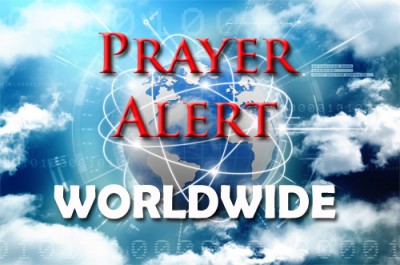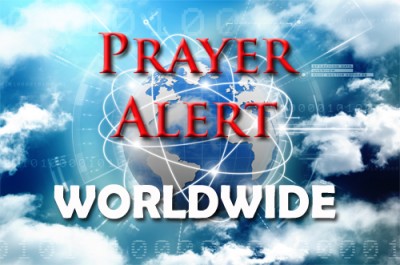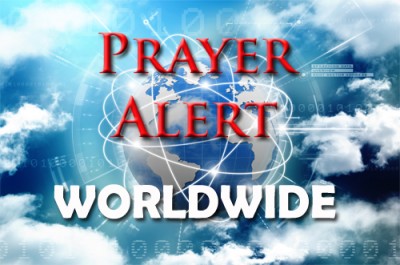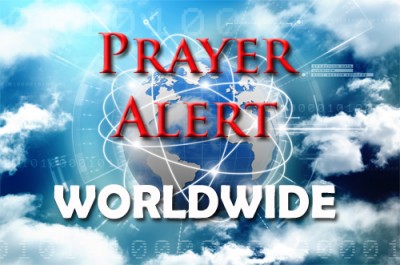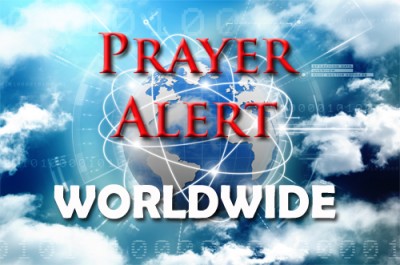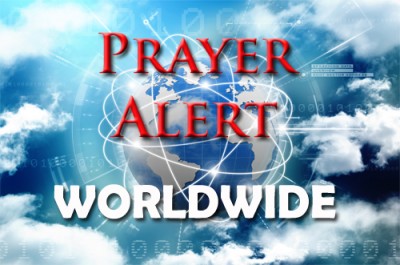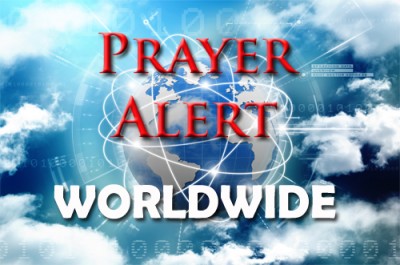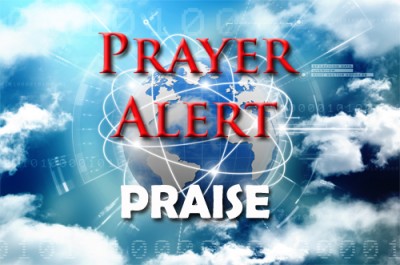Haiti: aftermath of the hurricane
14 Oct 2016Nuestros Pequeños Hermanos is a Christian orphanage, nurturing vulnerable children in family environments. One worker writes, ‘Finally the winds have eased and we can move about. So many stories of devastation after the hurricane. Houses gone, roofs blown away, animals lost, gardens destroyed - so, so sad. The worst of the storm came in gusts. I imagined Hurricane Matthew was a big dragon, blowing destruction on everyone. I was terrified trees would fall on us and I prayed to God to send His angels to hold back the trees. I imagined the angels doing just that. As I walked around the property this morning I couldn't help thinking the angels had been at work. Some trees fell inches away from children’s homes. The outdoor chapel is a mess, but is the only area in the whole property where there are no houses. How wonderful that Matthew claimed his trees there and not elsewhere!’
Central Asia: press freedom
14 Oct 2016In Azerbaijan, investigative journalist, former political prisoner, and Radio Free Europe contributor Khadija Ismayilova told a US congressional hearing of the harsh conditions faced by journalists who report on high-level corruption, saying, ‘There are no laws which state that journalism is a crime - but where critical journalism is concerned, it is difficult to enforce the rule of law.’ 138 political prisoners are in Azerbaijani prisons. In Belarus a blacklisted rock star who uses music to fight censorship has been given a Freemuse award for promoting freedom of expression through music (awarded annually by a Swedish organisation which advocates and defends freedom of expression). In Crimea, Mykola Semena, who contributes to a Crimea Realities website, was charged under the Russian criminal code after he wrote an article saying that Crimea, annexed by Moscow in 2014, should be returned to Ukraine. He is currently under house arrest in Simferopol.
Ethiopia: teenagers on trial for evangelism
14 Oct 2016Ethiopian evangelical Christians frequently face discrimination and harassment. Eden (15), Gifti and Mihiret (both 14), and Deborah (18) were distributing a Christian book in Ethiopia's main language entitled ‘Let's speak the truth in love - answers to questions’. The book answers questions posed about the Christian faith by a South African Islamic scholar who used to be head of the Islamic Propagation Centre International. Christians in a town east of Addis Ababa decided to distribute it following cross-cultural evangelism training. Local Muslims said the book was an insult to Islam. The four girls have made several court appearances and their case has been transferred to a higher court in Harar. Eden was beaten in prison but said, ‘This suffering is an honour for us. We should expect persecution. We are not afraid. We are singing and praying here in prison.’ Deborah said, ‘It is an honour to be jailed for God's Kingdom.’
Israel: terrorists and financing terror
14 Oct 2016A terror attack began at Ammunition Hill in Jerusalem on Sunday morning. The terrorist fired from his car at a train, wounding one woman critically. He then drove to Shimon Hatzadik train stop and opened fire at another car, wounding another woman. Meanwhile, Hezbollah's drug smuggling operations, used to finance terror in northern Israel, were exposed on an IDF interactive website last week. In July six suspects were arrested on suspicion of smuggling explosives that had been discovered south of Metulla and taken into custody for planning to carry out major terror attacks in Israel, according to a statement by the intelligence agency. In recent years, security services have dealt with several cases in which links were discovered between routes for smuggling drugs from Lebanon into Israel and routes for the infiltration of war material. See:
Venezuela: eating garbage to survive
14 Oct 2016Venezuela, once a candidate for 1st World status, has deteriorated to many citizens eating from dustbins to survive. A study found 15% of Venezuelans feed themselves exclusively with ‘food waste discarded by commercial establishments’. 75% of all Venezuelans do not eat a diet of breakfast, lunch and dinner every day. 54 % go to bed hungry, and 52% buy food through the black market. 48% took time off work to search for food. Many believe the severe food shortage is caused by Venezuela’s socialist economy. William Murray, chairman of the Religious Freedom Coalition, noted that when prices are allowed to rise in accordance with market forces, as in a free enterprise system, demand is reduced to a manageable level. But in Venezuela’s centrally- planned economy, the government does not allow producers to raise prices on their goods to keep up with increases in the cost of production. Therefore, producers cannot afford to produce as much as is needed, and shortages result.
USA and Russia chill in relations
14 Oct 2016A year after Russia stepped into the Syrian quagmire on behalf of President Bashar al-Assad, Moscow has challenged the US and NATO in virtually every arena possible. The Russians: - probably bombed a UN humanitarian aid convoy bringing relief, derailing joint US / Russian peace talks; - continue to strike civilian targets with chemical weapons; - sent nuclear-capable missiles to Kaliningrad, Russia’s European enclave; - suspended an agreement with the US to dispose of weapons-grade plutonium because of what they viewed as ‘unfriendly’ acts by the US; - sent missile defence batteries to Syria, and threatened to shoot down US planes flying in Syria without warning; - participated in military drills with China in the South China Sea (where China has illegally annexed and militarised artificial islands); - probably hacked the Democratic National Committee and other US government agencies and leaked information to the public to de-legitimise the USA's upcoming election and destabilise the country at large.
Aleppo being ‘held hostage’
14 Oct 2016UN Syria envoy Staffan de Mistura appealed to Jabhat al-Nusra, Syria’s al-Qaeda affiliate, to leave Aleppo saying, ‘1,000 of you are deciding the destiny of the 275,000 civilians.’ Jabhat al-Nusra’s role in Aleppo is omitted from most mainstream press accounts. John Kerry said, ‘Russia and the Syrian regime owe the world an explanation as to why they keep hitting hospitals, medical facilities, children and women’. He called for war crimes investigations. The understandable impulse to assist Syrians suffering as a result of war is heartfelt and laudable – but for policymakers, there is also the need to weigh the consequences of military action, reflecting on what was learned from interventions in Iraq, Libya and Afghanistan. Even the establishment of humanitarian or safe zones would entail a ‘major combat mission.’ See also article 4 in the British Isles section.
This month children in Syria are to meet in mass prayer, to end the ‘spiral of death’ that is killing hundreds of people in rebel-held districts of Aleppo. Christian and Muslim boys and girls in Aleppo will join together to pray for an end to the deadly bombing raids, Archbishop Boutros Marayati, head of the Armenian Catholic church in Aleppo, told Agenzia Fides, ‘Many cannot leave Aleppo. New blood will be shed if the powers behind the two warring parties do not decide to really put an end to this dirty war.’ The schoolchildren will sign and fingerprint an appeal begging world rulers to put an end to the massacres. ‘But above all, they will pray. They will pray for all of their peers. And we trust in the fact that children's prayer is more powerful than ours’, said Archbishop Marayati. See also article 1 (on the 4-14 window) in the World section.
